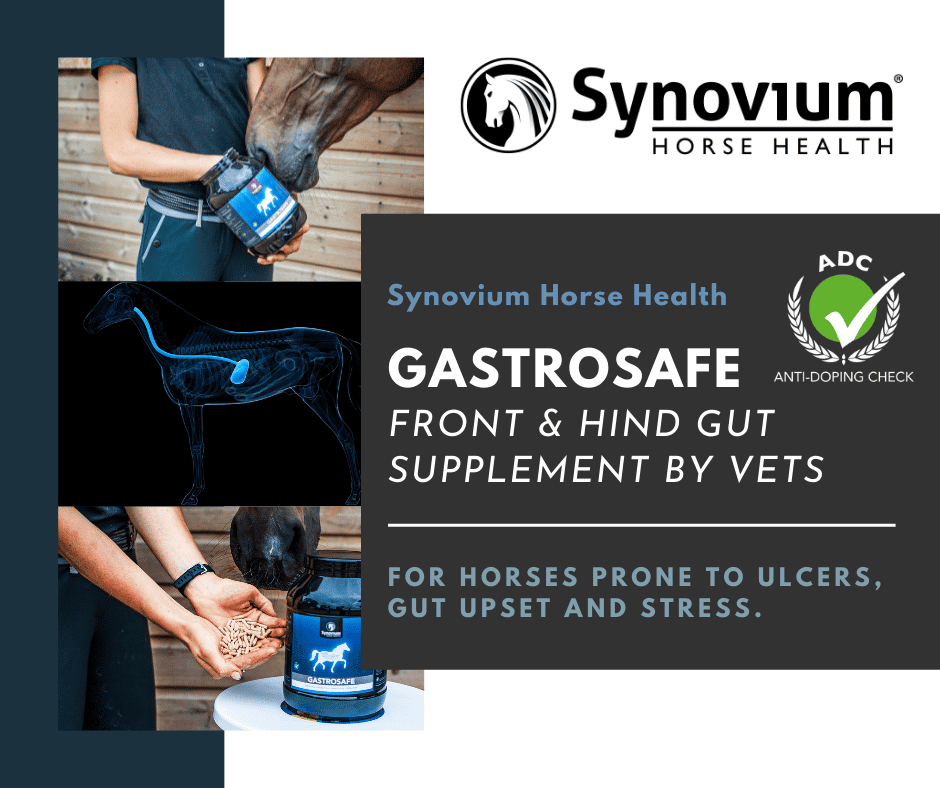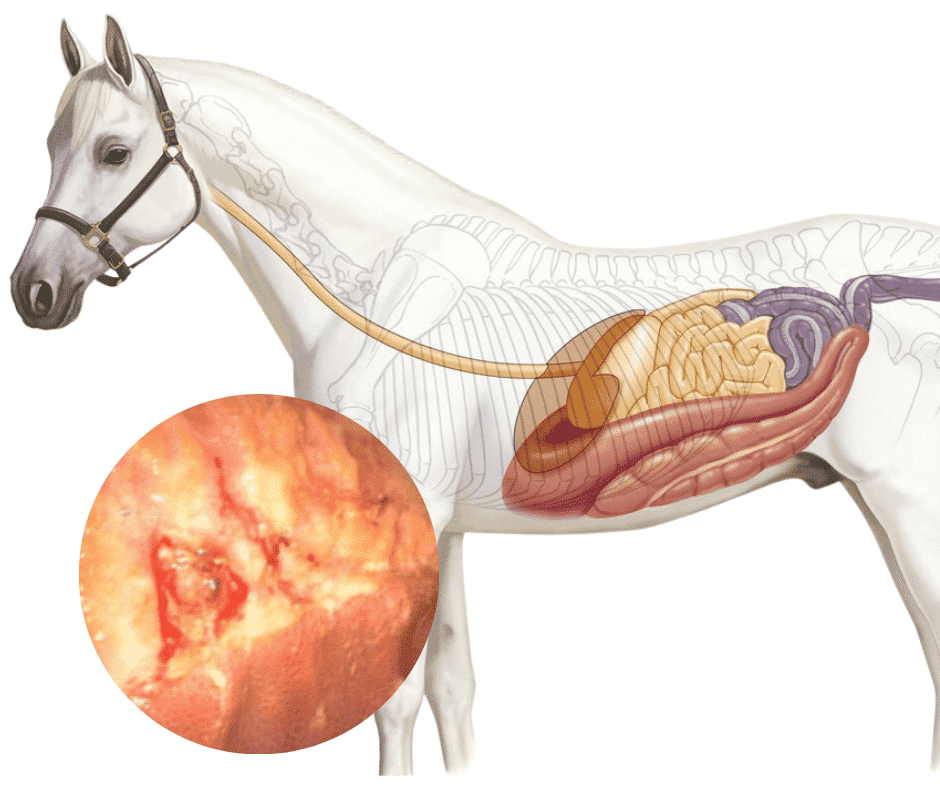What you need to know about EGUS and ulcer supplements for horses.
Equine Gastric Ulcer Syndrome (EGUS) frequently referred to as gastric ulcers in horses is a common problem.
Is your horse suffering from Equine Gastric Ulcer Syndrome (EGUS)?
Identifying those horses with gastric ulceration can be difficult as early signs can be confused with colic. Horses with ulcers can show mild colic-like symptoms so learn to read the signs of EGUS.
Equine gastric ulcers have been recognised more in recent years and it is important to understand the condition, why it can occur and the symptoms to look out for, to help prevent the high occurrence for future horses.
Some typical clinical signs of EGUS may include:
- Poor or fussy appetite
- Weight loss
- Poor condition, dull coat
- Reduced performance
- Behavioural changes
- Unwillingness to work
- Mild or recurrent colic
- Loose stools
Ulcers can affect any horse, but it is particularly prevalent in performance horses. They can occur in the horse’s stomach when the digestive acids come in contact with and attacks the protective lining of the stomach, mainly in the upper regions of the stomach.
The figures speak for themselves, with 60% of sports horses, 93% of racehorses and 50% of stabled foals showing to be affected by gastric ulceration.
Let us understand how the horse’s gut works…
Horses are hindgut fermenters, therefore meaning that the large intestine is where breakdown of fibre takes place. Fibre is the main component of the horse’s forage which is broken down by microorganisms to produce essential nutrients that the horse absorbs.
Because the hindgut is geared for fibre fermentation, it is susceptible to upset due to receiving large amounts of undigested sugars.
The ideal balance between these good microbes and harmful bacteria can be easily upset and now we will look into some of the causes of EGUS.
- Fasting or intermittent feeding has been shown to consistently induce gastric ulceration in horses. In the wild, horses are continuously grazing, so the stomach is rarely empty, the food in the stomach neutralises the stomach acid. When a domesticated horse experiences prolonged periods without forage, excessive amounts of acid build up causing ulceration.
- A predominantly grain diet would also upset the balance within the stomach. Diets high in concentrates have also been shown to induce ulcers. The carbohydrate rich grains are fermented to volatile fatty acids and undigested starch from concentrated feeds ends up in the hindgut. Avoid sudden changes in forage/ feed (7-10 days at least is recommended).
- Being exercised on an empty stomach is thought to contribute to the development of gastric ulcers. Exercising causes an increased intra-abdominal pressure in horses. During exercise blood flow to the stomach is reduced and the pressure in the abdomen is increased therefore pushing the acid up into the sensitive area of the stomach. It is suggested that if a horse has been stabled without constant access to forage, or if it has been more than a couple of hours since the horse last ate, you should feed your horse before exercise. The food will fill up the stomach and prevent acids from pushing up. However, you should only feed forage before exercising your horse such as hay.
- Physical stresses such as illness, infection, injury, shock, parasites, travelling, increased stabling may cause ulcers again due to the restricted blood flow to the stomach and an increased acid production.
- Psychological stress such as being in a stressful situation may cause an increased acid production.
It is important to keep the balance of good and bad bacteria exactly right for each individual horse.
Types of ulcers in horses
There are two types of ulcers in horses:
Squamous ulcers (ESGD) refer to ulcerative lesions effecting the squamous (top third) part of the stomach. They are caused by the physical splashing of the stomach acids on the stomach lining. They are normally associated with changes in appetite, poor performance or changes in behaviour. Squamous ulcers occur with restricted grazing, lack of access to water, high starch diets, exercising on empty stomachs, and psychological stresses.
Glandular ulcers (EGGD) occur less frequently and affect the bottom parts of the stomach, especially the antrum. Ulcers form slowly and occur when the integrity of the mucosal lining deteriorates. When this happens its natural defence system to gastric acid is compromised leading to the development of inflammation and lesions. The clinical signs are more variable and non-specific.
Treating ulcers in horses
In any case of suspected gastric ulcers your veterinarian should always be consulted. In most cases a gastroscopy will conclude the presence, severity, and the location of the ulceration. Prevention of ulcers is key we should mimic horses being at nature by allowing them to graze often or have access to forage such as hay frequently. This ensures neutralization of the stomach acid stimulating saliva production, which is nature’s best antacid. There are many ulcer supplements for horses on the market that claim to prevent gastric ulcers and you should only trust those that have been validated in competent scientific studies.

Synovium® Gastrosafe is an award winning veterinary gut and ulcer supplement for horses. Developed by independant Olympic vets to support horses recovering from gastric ulcers and to promote a health gut and stomach acidity.
It has been extensively researched by a veterinary team and nutrition experts for optimal gastric aid.
Gastrosafe helps control gastric acidity in horses, provides essential proven prebiotics, whilst supporting the natural anti-inflammatory processes in the front and hind gut.
Suitable for horses with poor appetite, poor condition, poor performance, digestive upset, loose droppings and behaviour changes.
Ideally fed to horses during or after veterinary treatment for ulcers to help support a healthy gut environment, providing a natural alternative to maintain a healthy GI tract and a happy horse long term.
A veterinary gut balancer will provide support to horses during stressful activities, travelling, competition and changes in routine.
No ingredients in Gastrosafe are listed on the FEI prohibited substances list. Competition safe, Anti-Doping checked.
Find out more about Synovium Gastrosafe here:
Synovium® Gastrosafe


